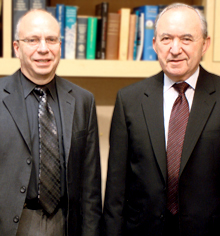
Judge Richard Goldstone gave the George Herbert Walker Jr. lecture in International Studies on January 27. He spoke to a packed Luce Hall on the subject of “Accountability for War Crimes.”
Goldstone is well qualified to address this topic, having served as chief prosecutor for war crimes tribunals in Rwanda and the former Yugoslavia. He also served for almost a decade on the Constitutional Court of his native South Africa. However, he is now best known for his examination of the conduct of Israel in its three-week invasion of Gaza in the winter of 2009, and of the Hamas-ruled government in Gaza, which had fired thousands of rockets over the border into southern Israel for years. His report faulted both sides, but more so Israel, and stirred up tremendous controversy.
In his prepared remarks, he spoke more generally about the modern development of laws relating to armed conflict, focusing on “universal jurisdiction, proportionality, equality and complementarity.”
He said, historically, the law of armed conflict was based on reciprocity – the idea that “If you look after my civilians and prisoners of war, I will reciprocate and look after yours. If you ill-treat mine, don’t complain if we ill-treat yours.” A war crime is committed, he explained, if civilians are attacked disproportionately. “In the absence of intent or a high degree of negligence, it is assumed that military action is proportionate.”
Goldstone noted that “perhaps the most important legacy” of the Nuremberg war crimes tribunal was recognition of a new kind of crime called crimes against humanity. “This was the birth of universal jurisdiction,” he said. “It followed that if crimes have an international character, then the courts of any country have the right – if not the obligation – to bring such persons to justice.”
He said equality among or within nations is more the exception than the rule, adding, “There is one law for powerful nations, and another law for the weak.” He criticized President George W. Bush for abrogating the treaty – negotiated by the Clinton administration – establishing the International Criminal Court, and insisting that no American could be charged under its provisions.
Finally, Goldstone defined complementarity as a government’s right to conduct its own investigation of alleged war crimes, and, if done honestly and not calculated to avoid responsibility, the international court would lose its jurisdiction in that case. Regarding his U.N. fact-finding mission on Gaza, he said only that “Both Israel and Hamas were found to have launched attacks against civilians in Israel and Gaza in a manner that constituted war crimes and possibly crimes against humanity.” He did not criticize Israel for defending itself, but criticized its lack of proportionality in the number of Palestinian deaths during the three-week operation. Those deaths numbered 1,385, more than half of them noncombatants, while 13 Israelis were killed during the operation and about the same number in the previous several years of rocket attacks from Gaza.
Goldstone ended his lecture by reiterating a comment he made throughout the lecture, referring to war crimes in general and the Middle East in particular. “It’s a complex issue,” he said. “Israel isn’t the only nation that’s being treated disproportionately, and in my view, unfairly. It’s a question of politics, not morality.”
